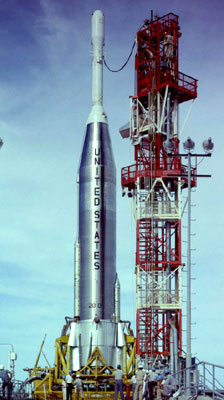
Atlas-Able
In-activeConvair ()
Nov. 26, 1959
Description
The Atlas-Able was an American expendable launch system derived from the SM-65 Atlas missile. It was a member of the Atlas family of rockets, and was used to launch several Pioneer spacecraft towards the Moon. Of the five Atlas-Able rockets built, two failed during static firings, and the other three failed to reach orbit.
Specifications
-
Stages
3 -
Length
35.0 m -
Diameter
3.05 m -
Fairing Diameter
3.05 m -
Launch Mass
120.0 T -
Thrust
1587.0 kN
Family
-
Name
Atlas-Able -
Family
― -
Variant
― -
Alias
― -
Full Name
Atlas-Able
Payload Capacity
-
Launch Cost
― -
Low Earth Orbit
― -
Geostationary Transfer
Orbit
250.0 kg -
Direct Geostationary
― -
Sun-Synchronous Capacity
―
Convair
Commercial
None
1943Convair, previously Consolidated Vultee, was an American aircraft manufacturing company that later expanded into rockets and spacecraft. The company was formed in 1943 by the merger of Consolidated Aircraft and Vultee Aircraft. In 1953 it was purchased by General Dynamics, and operated as their Convair Division for most of its corporate history.
Atlas-Able | P-31
Convair | United States of AmericaCape Canaveral SFS, FL, USA
Dec. 15, 1960, 9:10 a.m.
Atlas-Able | P-30 (Able VA)
Convair | United States of AmericaCape Canaveral SFS, FL, USA
Sept. 25, 1960, 3:13 p.m.
Atlas-Able | P-3
Convair | United States of AmericaCape Canaveral SFS, FL, USA
Nov. 26, 1959, 7:26 a.m.
Status: Launch Failure
Mission:
The Pioneer P-1, -3, -30 and -31 series was intended to be a lunar orbiter probe, but the mission failed shortly after launch. The objectives were to place a highly instrumented probe in lunar orbit, to investigate the environment between the Earth and Moon, and to develop technology for controlling and maneuvering spacecraft from Earth.
Lunar OrbitFalcon 9
Starlink Group 17-26
Space Launch Complex 4E - Vandenberg SFB, CA, USAA batch of 25 satellites for the Starlink mega-constellation - SpaceX's project for space-based Internet communication system.
Falcon 9
Starlink Group 6-110
Space Launch Complex 40 - Cape Canaveral SFS, FL, USAA batch of 29 satellites for the Starlink mega-constellation - SpaceX's project for space-based Internet communication system.
Falcon 9
Starlink Group 6-104
Space Launch Complex 40 - Cape Canaveral SFS, FL, USAA batch of 28 satellites for the Starlink mega-constellation - SpaceX's project for space-based Internet communication system.
Falcon 9
Starlink Group 17-25
Space Launch Complex 4E - Vandenberg SFB, CA, USAA batch of 25 satellites for the Starlink mega-constellation - SpaceX's project for space-based Internet communication system.
Falcon 9
Starlink Group 10-36
Space Launch Complex 40 - Cape Canaveral SFS, FL, USAA batch of 29 satellites for the Starlink mega-constellation - SpaceX's project for space-based Internet communication system. First Starlink laun…

